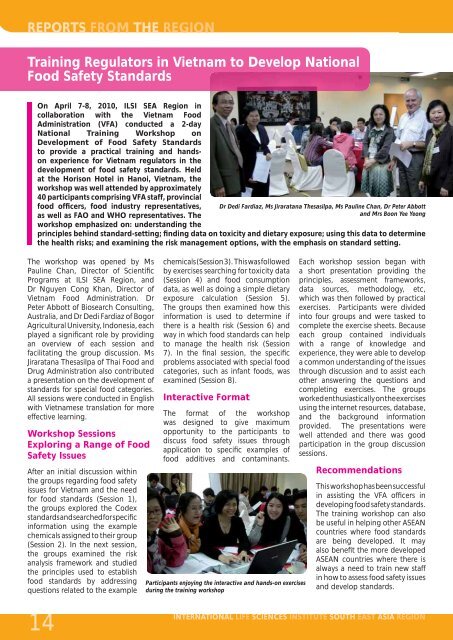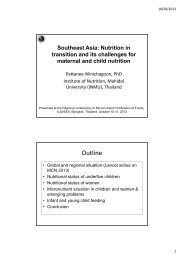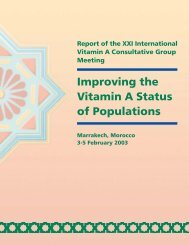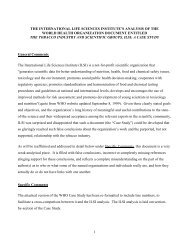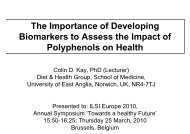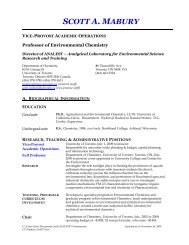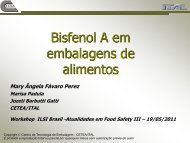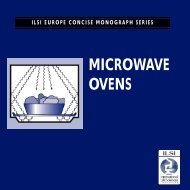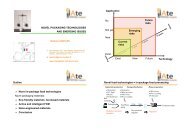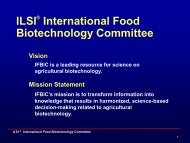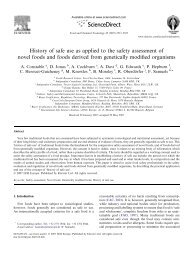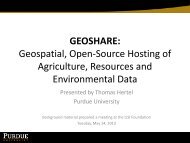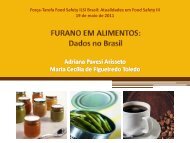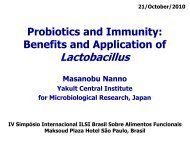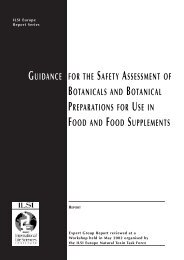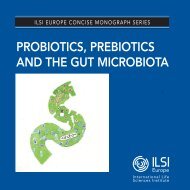REPORTS FROM THE REGIONTraining Regulators in Vietnam to Develop NationalFood Safety StandardsOn April 7-8, 2010, <strong>ILSI</strong> SEA <strong>Region</strong> incollaboration with the Vietnam FoodAdministration (VFA) conducted a 2-dayNational Training Workshop onDevelopment of Food Safety Standardsto provide a practical training and handsonexperience for Vietnam regulators in thedevelopment of food safety standards. Heldat the Horison Hotel in Hanoi, Vietnam, theworkshop was well attended by approximately40 participants comprising VFA staff, provincialfood officers, food industry representatives,as well as FAO and WHO representatives. Theworkshop emphasized on: understanding theThe workshop was opened by MsPauline Chan, Director of ScientificPrograms at <strong>ILSI</strong> SEA <strong>Region</strong>, andDr Nguyen Cong Khan, Director ofVietnam Food Administration. DrPeter Abbott of Biosearch Consulting,Australia, and Dr Dedi Fardiaz of BogorAgricultural University, Indonesia, eachplayed a significant role by providingan overview of each session andfacilitating the group discussion. MsJiraratana Thesasilpa of Thai Food andDrug Administration also contributeda presentation on the development ofstandards for special food categories.All sessions were conducted in Englishwith Vietnamese translation for moreeffective learning.Workshop SessionsExploring a Range of FoodSafety IssuesAfter an initial discussion withinthe groups regarding food safetyissues for Vietnam and the needfor food standards (Session 1),the groups explored the Codexstandards and searched for specificinformation using the examplechemicals assigned to their group(Session 2). In the next session,the groups examined the riskanalysis framework and studiedthe principles used to establishfood standards by addressingquestions related to the examplechemicals (Session 3). This was followedby exercises searching for toxicity data(Session 4) and food consumptiondata, as well as doing a simple dietaryexposure calculation (Session 5).The groups then examined how thisinformation is used to determine ifthere is a health risk (Session 6) andway in which food standards can helpto manage the health risk (Session7). In the final session, the specificproblems associated with special foodcategories, such as infant foods, wasexamined (Session 8).Interactive FormatDr Dedi Fardiaz, Ms Jiraratana Thesasilpa, Ms Pauline Chan, Dr Peter Abbottand Mrs Boon Yee Yeongprinciples behind standard-setting; finding data on toxicity and dietary exposure; using this data to determinethe health risks; and examining the risk management options, with the emphasis on standard setting.The format of the workshopwas designed to give maximumopportunity to the participants todiscuss food safety issues throughapplication to specific examples offood additives and contaminants.Participants enjoying the interactive and hands-on exercisesduring the training workshopEach workshop session began witha short presentation providing theprinciples, assessment frameworks,data sources, methodology, etc,which was then followed by practicalexercises. Participants were dividedinto four groups and were tasked tocomplete the exercise sheets. Becauseeach group contained individualswith a range of knowledge andexperience, they were able to developa common understanding of the issuesthrough discussion and to assist eachother answering the questions andcompleting exercises. The groupsworked enthusiastically on the exercisesusing the internet resources, database,and the background informationprovided. The presentations werewell attended and there was goodparticipation in the group discussionsessions.RecommendationsThis workshop has been successfulin assisting the VFA officers indeveloping food safety standards.The training workshop can alsobe useful in helping other ASEANcountries where food standardsare being developed. It mayalso benefit the more developedASEAN countries where there isalways a need to train new staffin how to assess food safety issuesand develop standards.14INTERNATIONAL LIFE SCIENCES INSTITUTE SOUTH EAST ASIA REGION
REPORTS FROM THE REGIONApplication of Codex Standards on Foods forCodex Standards haveInfants and Young Children in Indonesiabeen used as referenceand basis for a numberof regulations inIndonesia, including Codex Standards on Foods Intended for Infants and Young Children. However, theunderstanding and interpretation of these standards sometimes vary between individuals and institutions.Thus, it is important to have a common understanding and interpretation of Codex Standards, the developmentprocess and scientific criteria behind the Standards and Guidelines among all stakeholders to facilitate theappropriate adoption and implementation in the country. In response, <strong>ILSI</strong> SEA <strong>Region</strong> and its Indonesia CountryCommittee together with the Indonesian Paediatric Society (IDAI) organized a Seminar and RoundtableDiscussion on Understanding Codex Standards on Foods Intended for Infants and Young Children onApril 28, 2010, at Mandarin Hotel, Jakarta. Opened by Ms Pauline Chan of <strong>ILSI</strong> SEA <strong>Region</strong> and Dr Badriul Hegarof IDAI, the seminar was attended by 80 participants representing pediatricians, government officials, healthministry, nutrition associations and food industries.An overview and interpretation of thesaid Codex Standards was presentedby Dr Jeronimas Maskeliunas of JointFAO/WHO Food Standards Program,Italy. He first elaborated on thedevelopment process and scientificinput to establish the standards,codes of practice, guidelines, andother related documents. He thenlisted some of Codex documentsin the area of children’s nutrition.For example, the Codex Standardfor Infant Formula and Formulas forSpecial Medical Purposes Intendedfor Infants covers compositional,quality, safety, methods of analysis andlabeling requirements of the product,but does not cover all substancesfound in breast milk. Addition ofoptional ingredients is permittedupon scientific demonstration ofthe suitability and safety; sufficientamount must be present to achievethe intended effect. He concluded thatCodex standards, maximum residuelimits, codes of practice and otherrecommendations are of advisorynature and form a considerable sourceof harmonized information for useby governments and food industry.National governments can make theirown decisions, taking into accountthe assessment by risk assessors andscientists of the national agencies andinstitutions.Ms Tetty Sihombing, Director for FoodProduct Standardization at NationalAgency for Drug and Food Control(BPOM), provided an overview ofregulations in Indonesia governinginfant formula, follow on formula,and complementary foods. Sheoutlined the standardization processin Indonesia and highlighted someof the national standards which arevoluntary and the regulations whichare mandatory. She also shared thatthe country’s Regulation on InfantFormula and Infant Formula for MedicalPurposes Control was developed usingrelevant Codex Standards as the mainreference. Indonesia also has a NationalStandard for Follow on Formula and forComplementary Food of various types,which stipulates the quality, safetyand labeling requirements. These aredone to ensure that food for infantsand young children are optimum forgrowth and development.The seminar ended with a livelydiscussion moderated by Dr DediFardiaz of Bogor Agricultural Universityand Dr Aman Bhakti Pulungan, apediatrician of Cipto MangunkusumoHospital. The addition of optionalingredients was one of the issues raised,to which Dr Maskeliunas mentionedthat national governments shouldmake the decision on which optionalingredient to be allowed and thequantities allowed based on scientificevidence. While this is not an easy task,national authorities can take provisionsfrom other regulations that are alreadyin place. The task to determinesuitability and safety requires extensivescientific opinion and this issue canbe raised during Codex Committeeon Nutrition and Foods for SpecialDietary Uses (CCNFSDU) meetings.INTERNATIONAL LIFE SCIENCES INSTITUTE SOUTH EAST ASIA REGIONHe also clarified that nutrition andhealth claims for infant and youngchildren are not allowed in currentCodex guidelines. In response to thequeries for possible milk standard forchildren above 3 years old, BPOMwould require data that support theability of milk and milk supplementsto fill in the nutrient gap and providethe nutritional benefits before such amilk standard need to be set.The roundtable discussion betweenBPOM, IDAI, <strong>ILSI</strong> SEA <strong>Region</strong> andIndonesian Nutrition and DieteticsAssociation (PERSAGI) representativeswas chaired by Dr Dedi Fardiazand facilitated by Dr Maskeliunas.The discussion clarified issues suchas the definition of infant, youngchildren and children, definition ofpremature and low birth weightbabies, definition of complementaryand formulated supplementaryfood. The group also discussed riskmanagement options to reduce therisk of E. Sakazakii contaminationin reconstituted powdered milk,including the temperature ofwater used for reconstitution. DrMaskeliunas explained that underCodex Standards for Infant Formula,the essential and semi-essential aminoacids in human milk are presented as arange of values as well as mean valuesbased on different published studies.National governments may use themas reference to set up the nationalstandards for amino acids content ofinfant formula15


